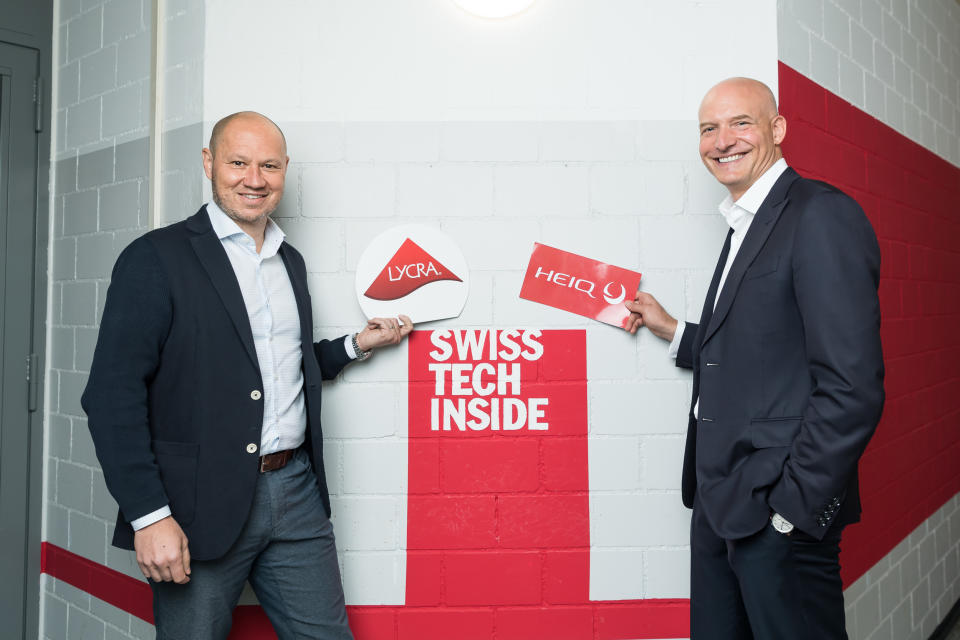HeiQ Wants Textiles to Be Smarter, Greener and Virus-busting, Too

LONDON — Carlo Centonze is in the business of making textiles smarter, able to resist a virus and stay fresh and dry after hours of wear. He also specializes in the sort of textile technology that can retain heat, or keep a body cool.
As the cofounder and chief executive officer of HeiQ Group, which is based in Zurich, Switzerland, Centonze’s job is also to make textiles more sustainable and long-lasting, and to find bespoke solutions for clients ranging from Burberry and Zara to Patagonia and Champion.
More from WWD
HeiQ works with a variety of companies across many industries, and on Thursday it unveiled its latest move: a “broad-based collaboration” with The Lycra Company across multiple technology and brand platforms. The two companies said they want to bring “innovative, quality-enhancing and sustainable textile technologies” to consumers worldwide.
In a recent interview, Centonze said his dream is for consumers to fall in love with their clothes, keep them for longer, care for them and ensure they don’t end up in a landfill.
“Fashion has a problem,” he said, pointing to the fact that most discarded clothes end up polluting the environment. While recycling is one solution, “it’s difficult because it’s hard to separate the components of clothing easily” or cheaply, he argued.
Instead, he believes that “people need to love their clothes,” wear them over and over again, and refrain from throwing them away.
HeiQ was founded in 2005 as a spin-off from the Swiss Federal Institute of Technology in Zurich, and is listed on the London Stock Exchange.
It boasts 14 offices, seven manufacturing sites and the same number of R&D hubs. It says it has a total capacity of 45,000 tons of specialty chemicals a year, and serves more than 1,000 industrial customers in upward of 60 countries.
The chemical finishes that HeiQ develops for clothing, home and industrial textiles can help cool and warm the body, and repel insects and viruses. Some of its finishes help garments remain wrinkle-free.
Centonze said the chemicals, production and supply chain are as sustainable as possible, and pointed to one technology that makes the dyeing of polyester less polluting. The solutions that HeiQ develops for brands are also as green as possible, he argued.
For Burberry, HeiQ has come up with a way to ensure the brand’s signature trenchcoats can remain dry without the use of harsh, environmentally unfriendly chemicals. Centonze said the chemical finish HeiQ created for the trenches is fluoride-free, ensures the fabric remains durable and won’t break down during dry cleaning.
For Patagonia’s base layers and jackets, he’s developed a bio-based odor-control technology using peppermint, while for Champion, HeiQ uses a dynamic cooling technology that coats the filaments of the fabric used for underwear.
He helped Zara to slash the amount of synthetic wadding it uses for its puffer jackets, replacing the extra bulk with a “mirror” made from recycled aluminum that reflects body heat back into the garment.

Image Courtesy of HeiQ
HeiQ has also developed anti-microbial, anti-viral finishes for different types of textiles — not just clothing.
“Textiles are vectors of infections, but we can make them anti-viral. We have the armory to do that,” said Centonze, adding that the virus-busting technology can be used for everything from dresses, jeans and shoes to “the seats on public transportation, the chair in Starbucks or a hotel room carpet.”
The new deal with Lycra is the fruit of exploratory discussions that started in early 2019, and the plan, according to both companies, is to “leverage shared strengths in textile science, commercial networks and global marketing” and to focus on innovations in stretch, thermoregulation, freshness and sustainability.
The two companies said the first of their many innovations will roll out this summer. The initial focus will be on products for the Chinese consumer, and the introduction of the first collaborative fabric is earmarked for the Intertextile show in Shanghai at the end of August.
“Our goal at HeiQ is to enable brands and mills in the textile industry to bring more comfort, performance and sustainability to textile products while raising brand awareness with key consumers who will benefit the most from these innovations,” Centonze said Thursday.
Steve Stewart, chief brand and innovation officer at Lycra, said that by “combining the strength of both companies, we will continue to drive meaningful innovation within the textile industry, delivering new solutions at a quicker pace to a broader audience.”
Sign up for WWD's Newsletter. For the latest news, follow us on Twitter, Facebook, and Instagram.